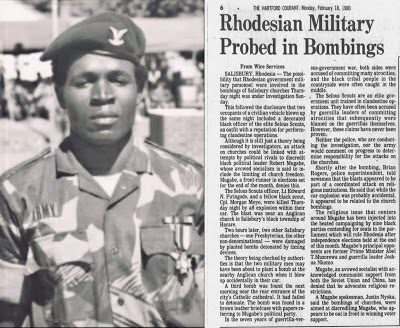History of British Rhodesia and Zimbabwe: The First Universal Elections. Rumours of A Coup Against Mugabe. The February 14th 1980 Failed “False Flag” of Selous Scouts Mission

All Global Research articles can be read in 27 languages by activating the “Translate Website” drop down menu on the top banner of our home page (Desktop version).
***
Robert Mugabe: Why are your men trying to kill me?
Lt. General Peter Walls: If they were my men you would be dead.
-Exchange between Mugabe, leader of the ZANU-PF political party and Walls, the head of the Rhodesian Armed Forces on March 17th, 1980.
The build up to the first universal elections in the history of Rhodesia, the country which after the elections would be reconstituted as Zimbabwe, was a tumultuous period. After the failure of internal settlement, the negotiations and hard bartering at the Lancaster House Conference, had, it was hoped, finally set the country onto the path of peace and national reconciliation. But tensions remained high during the campaign period.
There were rumours of a coup by the Rhodesian Army should Robert Mugabe win and a pledge by some White soldiers to continue the fight along the lines that the French O.A.S. had embarked once Algeria was lost. The Black political parties of ZANU and ZIPRA were accused of intimidating Black voters, and Mugabe threatened a civil war if he was disqualified by Lord Soames, the British Governor-General. Mugabe himself had survived two assassination attempts in Fort Victoria and Salisbury. The campaign was punctuated by episodes of violence, one of which involved the commission of a ‘False Flag’ operation by the Selous Scouts Special Forces unit.
On the night of Thursday, February 14th, 1980, the Black township of Harare was rocked by an explosion in a Renault 12TL Sedan parked near St. Mary’s Anglican Church. The occupants, two young Black men were fatally injured. Then a few hours later, two bombs exploded. One was at a Presbyterian church and the other at a non-denominational church. Another bomb would be found the following morning near the entrance of the city’s Catholic cathedral. The bomb had been placed in a briefcase containing papers referring to ZANU-PF (Zimbabwe African National Union – Patriotic Front), the political party led by Robert Mugabe.
Residents of Salisbury, the capital city soon to be renamed after the township, woke up to read an advertisement in the local paper which warned that Mugabe would close all churches if he was elected.
There was a link between the explosions and the advert. The bombs which damaged the Presbyterian church and the non-denominational one had been set by a timer, as police would discover, by the now deceased occupants of the bomb-wrecked Renault. The advert also appeared to have been timed to coincide with the previous night’s explosions, just as the undetonated bomb-in-a-brief case near the Catholic church was designed not to explode to implicate a political party because of the literature contained inside of it.
Police and agents of ZANU-PF were quick to put together the pieces of the jigsaw once the identities of the men who were blown up in the car were discovered. They were Lieutenant Edward Piringondo and Corporal Morgan Moyo, both members of the Selous Scouts, a Special Forces unit of the Rhodesian Security Forces, which had gained a reputation as the most effective fighting outfit against the Black African guerrillas during the 2nd Chimurenga or ‘Bush War’.
Formed in 1973 as a tracking unit, the Scouts quickly germinated into a multi-racial outfit tasked with waging unconventional warfare. Its members employed infiltration, abduction, torture, sabotage and blackmail. Many of the missions they undertook relied on deception, and such deception was used to either kill a large number of the insurgent enemy or to kill specific civilian targets in order to blame the Black African insurgents. They were also a key component in the waging by the White minority government of chemical warfare against their Black opponents.
Lt. Piringondo, an early African recruit, was a 27-year-old veteran of ‘pseudo-operations’, many of which involved infiltrating guerrilla bases. One such mission was carried out in November 1979 prior to ‘Operation Murex’, an attack on a ZIPRA brigade in the Kabanga Mission area of southern Zambia.
For this and other audacious assignments, Piringondo had won the Rhodesian Silver Cross (SRC), the country’s second-highest military decoration for conspicuous gallantry. He had also been nominated for the Grand Cross of Valour which, had the Scouts not been disbanded, would have made him Rhodesia’s most decorated soldier.
Piringondo was thus the sort of man on which the Scouts could call upon to perform a mission which was designed to implicate the military wing of Mugabe’s Marxist-orientated party and paint Mugabe as anti-religion and anti-religious freedom.
But it was a mission too far for Piringondo and his accomplice in arms, Moyo, both of whom Mugabe would state with some relish had been “caught and destroyed in their devilish trap”.
*
Note to readers: please click the share buttons above or below. Forward this article to your email lists. Crosspost on your blog site, internet forums. etc.
This article was originally published on the author’s blog site, Adeyinka Makinde.
Adeyinka Makinde is a writer based in London. He has a keen interest in history and geopolitics. He is a frequent contributor to Global Research.
Featured image: Lt. Edward Piringondo, a decorated member of the Selous Scouts (left), and clipping of the Monday, February 18th edition of the Hartford Courant (Source: Adeyinka Makinde)


